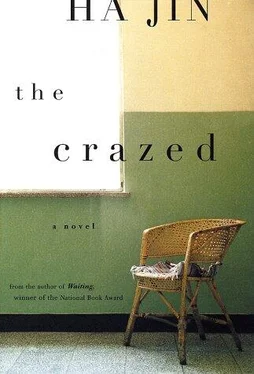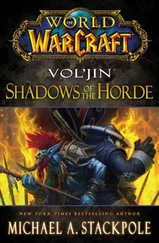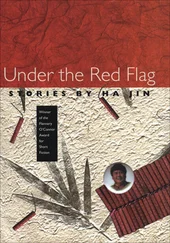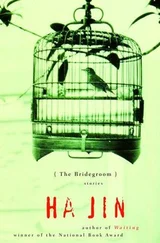The vehicles started snarling one after another, then lunged forward as people swung away, struggling to avoid being crushed. All the personnel carriers and trucks began rolling, unstoppable like a crazed dragon. In no time gunshots burst out. The troops were firing at the people who couldn’t yet get out of their way and at us, the ones taking off.
“Real bullets!” a woman screamed.
“Oh, Mama!”
“Ah my leg!”
“Run for your lives, folks!”
“I’m killing all of you hooligans. Take this!” a soldier shouted and kept firing his AK-47. Some men in the same truck guffawed as they were shooting away.
“Now you see your grandpa’s temper,” cried another man while his rifle was cracking.
“No grenades!” ordered the colonel.
More guns were fired, and people broke into every direction. Not knowing where I could find safety, I just ran as fast as possible, following a young woman before me. She looked like a college teacher or a graduate student, wearing bobbed hair, brass-rimmed glasses, and a pastel dress with accordion pleats. As we were approaching a tall billboard, a volley of gunfire swept down a few people ahead of me. The young woman fell, then scrambled to her feet and zigzagged forward, shrieking, with both hands holding her bleeding left side. One of her shoes was missing, and her white stockings were soaked with blood. I pulled her aside to keep her from being trampled. She dropped down, but I dared not stop to carry her away because more bullets whizzed by, drawing blazing lines. I fled with the crowd, running and running until we ended in a small alley. My heart was beating so violently that I couldn’t help trembling.
Calming down a little, people began cursing and crying. I wept too, but I was so shocked that the whole time I couldn’t speak and my nose was dripping. A moment later someone shouted “Down with Fascism!” People followed him, roaring in unison. We went on howling “Down with Li Peng!” “People’s Army go to hell!” “A tooth for a tooth and an eye for an eye.” As we continued bellowing, bullets went on hitting the walls at the mouth of the alley, knocking chips of brick off the corners.
Having shouted ourselves hoarse, we stopped and began talking, trying to figure out why the army had suddenly gone on such a rampage. But as the enormity of the event sank in, many of us grew reticent. An amalgam of loneliness and grief overwhelmed me. I hadn’t intended to come here to fight for democracy, but now I was caught up in a tragedy that didn’t make sense to me at all. I shouldn’t have been here to begin with. Then I remembered the wounded woman I had left behind; she must have died by now. Why hadn’t I carried her away to a safe place? She must have bled or been trampled to death. Coward! I couldn’t even prove to myself that I was above cowardice. This realization brought me to tears again. I wept wretchedly. An old woman patted my shoulder, saying to no one in particular, “Lord of Heaven, please save those kids in Tiananmen Square!”
Her words reminded me that the troops were headed for the square to get rid of the students there. So this was it! Again a numbing pain tautened my chest.
“I do Deng Xiaoping’s mother!” cursed a man, his round eyes aflame. He had a bristly face, which had become murderous.
“Li Peng will have to pay for this with his life,” a short woman cut in.
“I know where his daughter lives. I’ll blow up her apartment one of these days.”
“Yes, they are our class enemy now.”
After a pause, someone added, “The troops must’ve been drugged.”
“Yes, they looked crazy.”
“I smelled alcohol on the colonel’s breath.”
“They’re a different unit. I heard they’d been brought in from Datong or somewhere.”
“A bunch of bandits.”
After about an hour’s cursing and talking, some people grew restless, eager to go home or look for their siblings and friends who had come out to stop the army too. But the instant they stepped out of the alley, volleys of bullets would force them back in. Apparently the army was determined to keep everybody off the street. A loudspeaker was ordering all civilians to obey martial law and stay indoors because the People’s Liberation Army was suppressing the counterrevolutionary uprising so as to restore order in the city. The announcement brought out more curses among us.
A woman student, grazed in the arm by a bullet when she had attempted to get out into the street, sat on the ground blubbering hysterically. Now and then some people would stick their heads out of the alley to watch what was happening on the street. Units of tanks passed frequently, roaring fitfully. I searched through the hundred people trapped in the alley, but didn’t find anyone of my group. I was worried about their safety and whereabouts.
Exhausted and hungry, I sat down in a corner and soon dropped off despite the crowd milling around. During my two or three hours’ sleep, I vaguely heard that another person had been wounded while trying to leave and had been carried back into the alley. When I woke up, I couldn’t help shivering; the night was chilly; if only I had brought a jacket. I went to the mouth of the alley, lay down, and stuck my head out to see what it was like out there. A puff of fireflies was flickering before my face. In the distant sky an orange glow pulsed while the sound of gunshots was rising from somewhere as though a battle was under way. Two or three armored personnel carriers stood at a nearby street corner; beyond them dozens of soldiers in fatigues and helmets crouched against trees or sat on the curbs, all with AK-47s or SKS carbines in their arms. One of them fired three shots up at a window of an apartment building from which some residents had called them names a moment ago.
As I watched, a boy suddenly appeared on the street. He threw an empty bottle at the soldiers, then dashed aside, running to a doorway; but before he could enter it, a gun fired. “Aiyah, I’m hit!” The boy fell, screaming for help. A few more heads joined me watching.
A group of soldiers ran over and kicked the boy in the chest and back. “Don’t beat me, Uncle!” he begged, but they went on battering him with their gun butts. In no time he stopped making noise.
“We must save him,” I said.
“Yes,” agreed a young woman in a white blouse. “He may still be alive.”
“The Benevolence Hospital isn’t far away to the south,” said an old bald man.
“Can you show us the way?” I asked him.
“How can I get out of here?”
I found a long bamboo broom, took off my white shirt, and raised it on the tip of the wooden handle like a flag. Stepping out of the alley, I cried at the soldiers, “Comrades, please don’t shoot. I just want to save the boy’s little life. He’s only a kid. Please give him a chance!”
Though quaking all over, I walked straight toward the dark lump lying about eighty yards away. The soldiers didn’t open fire. Then the young woman came out of the alley too, followed by a few others, one of whom carried a board dislodged from a wheelless flatbed tricycle.
“Only three people can come to take him away!” ordered an officer.
So the woman, the old man, and I went up to the boy together. His chest was crushed and his left thigh drilled by a bullet, but he was still breathing. He looked about thirteen, wearing a middle school badge. As I squatted down, about to use my shirt to bind his gun wound, the woman said, “We’ll need that. Take this.” She bit the bottom of her blouse, with one rip tore its hem off, and handed the broad strip of cloth to me. With it I tied up the boy’s thigh to stanch the bleeding. Meanwhile, the old man shed his jacket and wrapped the boy’s wound with it to prevent tetanus. We placed him on the board and carried him away.
Читать дальше

![Lao Zi - Dao De Jing [Tao Te Ching] (english)](/books/3890/lao-zi-dao-de-jing-tao-te-ching-english-thumb.webp)
![Lao Zi - Dao De Jing [Tao Te Ching] (chinese)](/books/3891/lao-zi-dao-de-jing-tao-te-ching-chinese-thumb.webp)
![Lao Zi - Dao De Jing [Tao Te Ching] (espanol)](/books/3892/lao-zi-dao-de-jing-tao-te-ching-espanol-thumb.webp)







